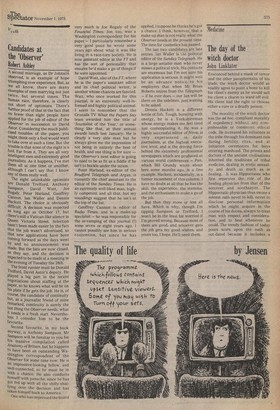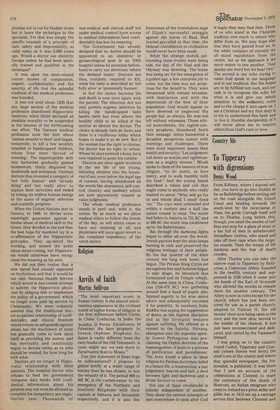Medicine
The day of the witch doctor
John Linklater
Ensconced behind a mask of terror and the other paraphernalia of his trade, the witch doctor would as readily agree to point a bone to kill, his client's enemy as he would sell his client a charm to ward off evil. His client had the right to choose either a cure or a deadly poison.
The morality of the witch doctor was the ad hoc, compliant morality of expediency without any comprehensible or consistent ethical code. He increased his influence in the tribe through his dominant role during fertility rites, and at initiation ceremonies for boys entering manhood. The priests and doctors of the ancient civilisations inherited the traditions of tribal medicine, dealing in erotic sexuality and death as much as in healing. It was Hippocrates who first separates the role of the healing physician from that of the sorcerer and soothsayer. The Hippocratic physician thus swore a solemn oath never to kill, never to disclose personal information which he might acquire in the course of his duties, always to treat man with respect and consideration, and to heal whenever he could. The trendy fashion of today pours scorn upon the oath as out-dated because it includes a promise not to cut for bladder stone but to leave the technique to the specialist. Yet that was simply the specific example of a principle of care, safety and responsibility, as valid today as it was 2,000 years ago. Would a doctor use obstetric forceps unless he had been specially trained and qualified in the technique?
It was upon the inter-related corner stones of compassion, respect, confidentiality and the sanctity of life that the splendid tradition of the medical profession was founded.
It was not until about 1935 that any large section of the medical profession abandoned Hippocratic medicine, when Hitler declared all absolute morality to be suspended in the interest of the forthcoming war effort. The German medical profession took the hint about 'useless mouths to feed' and began, tentatively, to kill a few severely retarded or handicapped children, whose lives were 'devoid of meaning'. The imperceptible drift into barbarism gradually gained momentum, thinly disguised by doubletalk and newspeak. German doctors thus invented a category of not fully human' and 'already dying' and 'not really alive' to explain their atrocities and ended by killing six million human beings in the name of eugenic selection and scientific progress.
When the United Nations met in Geneva, in 1948, to devise some watertight guarantee against a similar abuse of medical skill in the future, they decided in the end that the best hope for mankind lay in a re-affirmation of the Hippocratic principles. They up-dated the wording, and missed the point about stone-cutting, but Hippocrates would otherwise have recognised the meaning as his own.
We did not then realise that a new threat had already appeared on the horizon and that it would be our own National Health Service which would in due course attempt to subvert the Hippocratic physician by obliging him to implement the policy of a government which no longer even paid lip service to Christianity. We were solemnly assured that the traditional doctor-to-patient relationship of confidentiality and clinical freedom would remain as safeguards against abuse, but the machinery of state has gradually come to look upon itself as providing the money and has inevitably and insidiously begun to dictate terms as to who should be treated, for how long for with what.
Doctors are no longer in Hippocratic relationship with their patients. The hospital doctor who refuses to feed the government computer data banks with confidential information about his patients may not even be allowed to complete his compulsory pre-registration year. Thousands of ' non-medical and clerical staff not under medical control have access to medical information, sand confidentiality has lost its meaning.
The Government has already declared that no doctor should be appointed to an obstetric or gynaecological post in an NHS hospital unless he promises beforehand to carry out abortions 'where the demand exists'. Doctors are thus, routinely, required to kill, while the baby is described as 'not fully alive' or 'potentially human'.
In fact the choice between life and death is now once again with the patient, The Abortion Act not only permits eugenic selection by killing the handicapped baby beofre birth but even allows the healthy child to be killed if the mother so directs the doctor. The choice is already hers de facto and there is a vociferous lobby which hopes to make it so de jure. But if the woman has the right to choose, the doctor has no right to refuse. Where he once pointed a bone, he is now required to point his curette.
Doctors are once again involved in the sex life of the young, initiating children into the mysteries of sex, even below the legal age of consent, having abandoned all the words like abstinence, self-control, chastity and modesty which are now pejoratively classed as value judgments..
The whole medical profession stands in peril and, with it, the nation. By as much as we allow medical ethics to follow the trends of the day, so will ethics cease to have any meaning at all, and physicians will once again revert to the compliant expediency of the witch doctor.

































 Previous page
Previous page